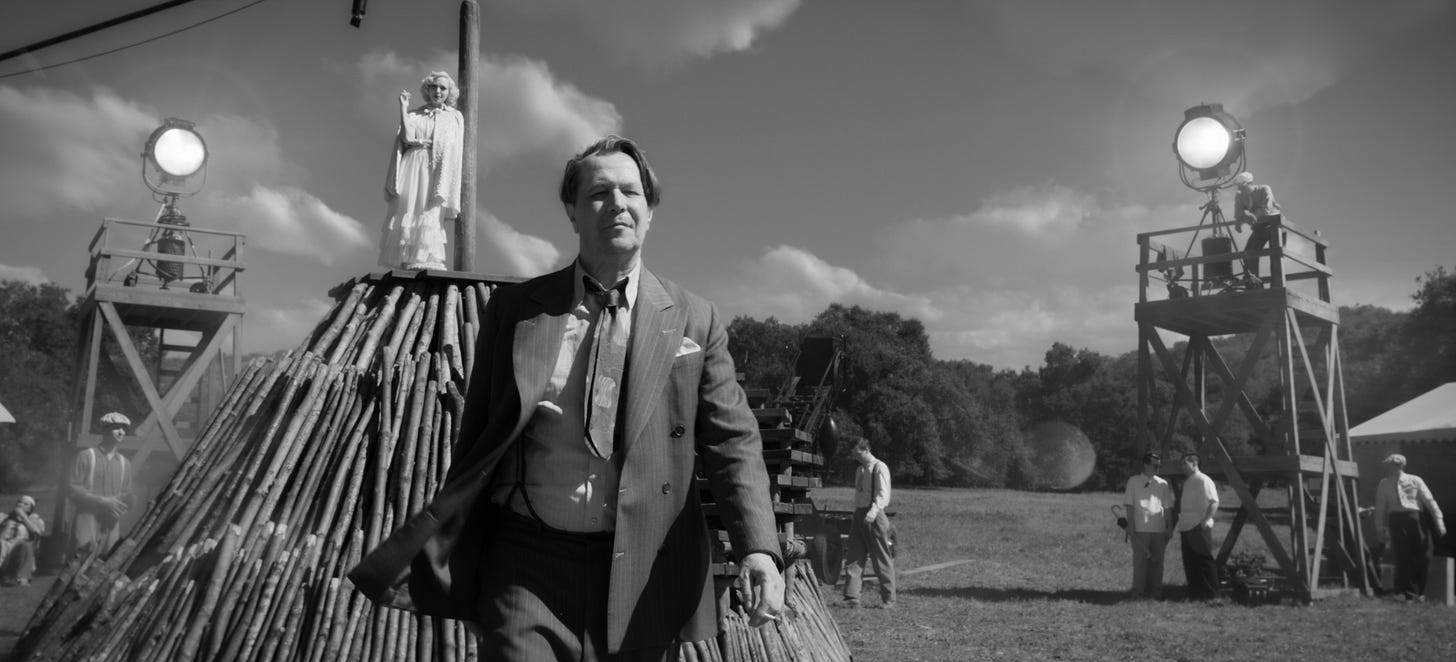Image Credit: Netflix
Welcome to the latest edition of Weekend Watch, in which I recommend (or occasionally warn against) movies or TV shows I’ve been checking out. This week, David Fincher goes all Orson Welles… Sort of.
If his legendary perfectionism, auteur style and lack of ability to suffer fools gladly lead you to believe that David Fincher is the only filmmaker who could tackle the making of Citizen Kane, then director Benjamin Ross and producer Ridley Scott have a TV movie called RKO 281 to show you. And yet he’s still a perfect choice.
But Fincher’s interest isn’t Kane at all, not really. He’s more focused on the struggles of the film’s scriptwriter, Herman J. Mankiewicz (Gary Oldman), who toiled over the screenplay for what is commonly seen as one of the best movies of all time. And, in a wider sense, the target is Hollywood itself during the 1930s and 40s, a time when Netflix couldn’t even be imagined. Had you suggested to Mankiewicz that his life story would be primarily brought to the world on an internet service to TVs, he’d probably wonder whether you’d suffered a blow to the head, and make some smart-mouthed remark about it.
Mank represents a passion project of Fincher’s finally coming to fruition. His late father, Jack, wrote the early drafts and the director has worked on it on and off since the days of Alien 3, bringing in Eric Roth to “noodle” (as Welles might have said) on the structure and dialogue, though unlike Kane, Fincher’s film remains solely credited to Jack.
And it’s certainly to both men’s credit that the result is so successful. Fincher has crafted something truly impressive here, visually unlike anything he has made for years and shot with the aesthetic of the time. There are even simulated cigarette burn rings that pop up to indicate a reel change, something no one would expect on a Netflix release in this digital era. The production design, shooting style (cinematographer Erik Messerschmidt aiding in making it look spot-on) and performances are all work to conjure up the idea that what you’re watching could have been cooked up in the era of old Hollywood.
Oldman is naturally great, flipping between the charming and the washed-up Mank, but never forgetting they are one and the same; while Tom Burke’s Welles is sprinkled in sparingly, the spice in the story since this isn’t all about him for once. Amanda Seyfried does some of her best work as Marion Davies, consort to William Randolph Hearts (Charles Dance), who will become the satirical focus of Mank’s future scripting efforts. Lily Collins is great value as Rita Alexander, the British assistant brought in to scribble down and type up Mank’s writing process, and (unsuccessfully) keep him from the liquor. Among the others, credit to Ferdinand Kingsley as producer and MGM co-founder Irving Thalberg, who unlike some of his colleagues, vanishes into his part with skill and ease.
Fincher also borrows from Kane’s time-hopping structure, flipping between Mank writing the script as he recovers from injuries received in a car crash and his earlier, even boozier days working with the likes of Ben Hecht (Jeff Harms), Sid Perelman (Jack Romano) and George S. Kaufman (Adam Shapiro) on screenplays for the giant studios of the time – Paramount, MGM and the like. There’s also a political thread running through the movie, as Mank tracks the efforts of MGM boss Lois B. Mayer (Arliss Howard) to make sure that writer and noted socialist Upton Sinclair (Bill Nye in a blink-and-you’ll-miss-him cameo) isn’t elected governor of California. It’s a fascinating look at the politics of the time, but the themes of fear, propaganda and outright lies have plenty of pertinence to today. The flashbacks, artfully cued by script directions appearing on screen, help fill in some of the man Mank was then and what he will become.
For all the dexterity and top–rate acting on display here, Mank does suffer a little from Fincher’s decision to lean into making the movie as it would have been back in the day. There’s a reason that they don’t make ‘em like that anymore, and the effect is more than a little distracting at times. There are also several sections that could have benefitted from some Welles-ian edits, scenes falling prey to unnecessary artifice.
Yet if you’re someone fascinated with Hollywood of the time, have a passing wish to learn more about Mankiewicz or are simply starved for new Fincher filmmaking, his latest effort will be satisfying on several levels.
Mank is on Netflix now.



